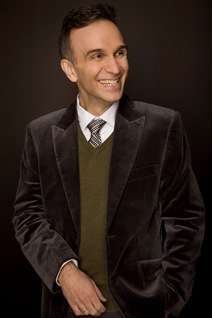|
Back
Parisian Ballet at the Symphony Washington
The Kennedy Center
02/28/2019 - & March 1, 2, 2019
Albert Roussel: Le Festin de l’araignée, Op. 17: Symphonic Fragments
Wolfgang Amadeus Mozart: Violin Concerto No. 5 in A major, K. 219
Igor Stravinsky: Petrushka
Gil Shaham (violin)
The National Symphony Orchestra, Lionel Bringuier (conductor)

G. Shaham (© Luke Ratray)
As suggested in the program book, this week’s NSO program is very nearly French-themed, book-ended as it is by music originally composed for ballet in Paris in the years leading up to World War I. Yet in between we take a detour to eighteenth-century Salzburg for what may have been the concert’s primary selling-point, beloved violinist Gil Shaham in Mozart’s final concerto for his instrument. Short on virtuoso fireworks yet long on lyrical charm, this work is largely a superb vehicle for Shaham’s highly elegant, rather slender, and always evenly sustained tone as well as his seamless phrasing. I would not have minded a little more dramatic variety at times, although Shaham suitably roughened his tone up just a bit for the “Turkish” episodes of the finale, but inarguably this was playing of a very high order. For the encore, Shaham was gracious enough not only to share the stage with concertmaster Nurit Bar-Josef in the Gavotte from one of Jean Marie Leclair’s sonatas for two violins, but to take the accompanying part himself. If Bar-Josef did not match Shaham’s gleaming tone, her playing here lacked nothing whatsoever in terms of expressive phrasing. What a pleasure to hear Baroque chamber music (other than Bach’s works for solo violin) played so sensitively and unapologetically on modern instruments in a modern style, for once.
Lionel Bringuier’s accompaniment in the concerto was quite satisfying as well. I was relieved that we were spared the “period”-style mannerisms and tonal austerity that afflict so many performances of Mozart in the concert-hall today. Nor was the orchestral part “phoned in” or sluggish in any way. Indeed, Bringuier emphasized both the dignity and the musicality of the piece, with a reading that was not especially sparkling or buoyant but brought well-sustained long lines in place of the highly molded phrasing that marked last season’s wonderfully original Mozart 39th Symphony from Noseda. There was plenty of dynamic contrast as well, but it was always well prepared, never breaking the fabric of the line.
The remainder of the program brought a rather different set of demands as far as conducting goes, and Bringuier did not falter here either. The opening Roussel suite is rather delicately scored for much of its duration, in spite of the number of instruments required, and there are more highlights for solo winds than for massed strings. It is indeed a much quieter work than Petrushka, certainly impressionistic but to my ears somewhat more fresh, lyrical, and direct than Debussy. The complete ballet—The Spider’s Feast—depicts the struggle between a spider and her would-be insect victims; Thomas May’s program notes provide a vivid guide to the scenes represented in the excerpts heard here, but the suite achieves enough musical coherence that one can enjoy it as absolute music, without reference to the story. Anyhow, both here and in the concluding Stravinsky, Bringuier held together his instrumental forces—quite large in Petrushka, one must note—quite neatly yet with no hint of restraint, and he elicited some very characterful and musical playing from wind and brass soloists. The occasional vibrato in the trumpets in Petrushka in particular brought a charming sense of local color. The strings evinced a sense of struggle at times in the Stravinsky, and they never provided the sort of velvety cushioning of the Boston strings that marks the last recording of the work by Pierre Monteux (who had premiered both Petrushka and The Rite of Spring), but they made a rather robust contribution to the closing Shrovetide Fair scene in particular.
Samuel Wigutow
|